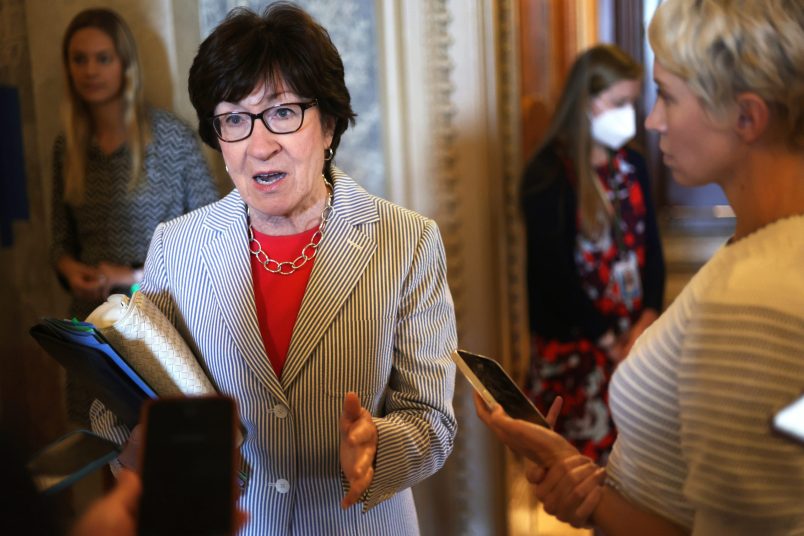Sen. Tim Kaine (D-VA) said it himself upon unveiling a new, bipartisan bill that would, at the very least, codify the right to an abortion into federal law: it’s the bare minimum.
“What the four of us were trying to do was put a statutory minimum in place that replicated what the law was a day before Dobbs,” Kaine said of the Reproductive Freedom For All Act, which he introduced with Sens. Susan Collins (R-ME), Lisa Murkowski (R-AK) and Kyrsten Sinema (D-AZ) this afternoon.
The language of the law is a bare bones compromise, seemingly aimed at putting something on the books that would prevent red states from outright banning access to abortion, which we’ve seen proposed and passed in several states across the nation since the Supreme Court overturned Roe in June. It could also help protect people living in states with old trigger laws on the books that are now going into effect post-Roe.
The bill was also introduced with no guaranteed support from the number of Republican senators needed to overcome the filibuster. Kaine nodded at that practicality as well on Monday, calling it mostly an effort to outline some middle ground between Republicans and Democrats on an issue that the majority of Americans from all sides of the political spectrum support despite Roe’s overturning — that Americans should have access to safe abortion care.
The bill protects the right to contraceptive access and preserves “conscience protections” — a hobbyhorse for Collins who has been vocal about protecting the religious freedom of practitioners and physicians who want to opt out of abortion care for moral reasons. The bill would also “prohibit state regulations that impose an undue burden on a woman’s access to pre-viability abortions, while allowing states to enact reasonable restrictions on post-viability abortions – provided that states cannot ban abortions that are necessary to protect the life or health of the mother,” the group outlined in a press release Monday.
So in essence the legislation would codify the right to an abortion up to the point of viability into federal law and would also protect the right to abortion care after viability if the life of the pregnant person is at risk. But the language of the text doesn’t define what the point of viability is and establishes that viability and/or the level of threat to a pregnant person’s life be defined by a person’s physician.
“It clearly uses viability as a key distinction,” Kaine said. “Pre-viability women should have significant freedom — a state can regulate but can’t put an undue burden. Post-viability, the state can regulate a lot more, but can never stop a woman from accessing an abortion for her life and health.”
The bill will likely not go anywhere in a 50-50 Senate, but is one seemingly aimed at Sen. Joe Manchin (D-WV) who took issue with the sweeping abortion protections in the House-passed Women’s Health Protection Act. Collins and Murkowski, who have long claimed to support some women’s health and reproductive rights, also opposed the WHPA because, like Manchin, they argued it went further than Roe in protecting abortion access. Collins was also opposed because it didn’t include the conscience protection provision.
“By reinstating — neither expanding nor restricting — the longstanding legal framework for reproductive rights in this country, our bill would preserve abortion access along with basic conscience protections that are relied upon by health care providers who have religious objections,” Collins, who has been widely criticized for her vote to confirm now-Supreme Court Justice Brett Kavanaugh, said in a statement today.
It’s unclear if Senate Majority Leader Chuck Schumer (D-NY) would even entertain bringing it to the floor without enough votes to overcome the filibuster after Manchin and Republicans killed the WHPA. And it’s even less clear if he would agree to it ahead of Midterms when Democrats are pushing a unified message as the party that will protect abortion care in a post-Roe America, and as some Democrats push for a carveout to the filibuster so it would only take 50 votes to codify more sweeping abortion rights into federal law.
A cynical, but perhaps not unrealistic, read is that the bill gives Murkowski and Collins something to nod at as supposed defenders of reproductive rights.
The Best Of TPM Today
Here’s what you should read this evening:
An update on this bizarre story from Josh Kovensky: Fake DHS Agent Admits To Impersonating Feds
Graham Follows Through On Challenge To Fulton County DA Subpoena
Michigan Appeals Court Says Counties Can Enforce Abortion Ban
Biden Still Testing Positive For COVID But Feels Well, WH Says
Michigan Sec. Of State Braces For Certification Shenanigans In Primary Elections
Sign up for TPM’s voting rights newsletter here: The Franchise: Headed Toward A Banner Tuesday For Election Deniers
Yesterday’s Most Read Story
Arizona House Speaker: I’ll ‘Never Vote Again’ For Trump — Summer Concepcion
What We Are Reading
We Can’t Save the Planet and Make ExxonMobil Happy — David Sirota
Trump Supporters Think They’re in a Fight to the Death — Peter Wehner
Vets are protesting outside Capitol to push for new toxic exposure bill — Leo Shane III






